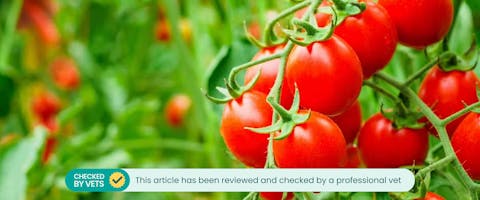Updated 13/07/2023
It’s safe to say that we humans are tomato-mad - they’re one of the most widely-used fruits in our cooking, and they’re a common garden plant. Fun to grow and harvest (not to mention that delicious aroma they waft around the garden), it’s no wonder they’re so popular. But if you’ve got a furry family at home, you’re probably looking for ways to make sure your home and garden are as safe as possible for them. So, are tomato plants toxic to dogs? Let’s find out.
Trending posts
Purr-use some of the top blogs our members have been loving this month- Top male dog names for your new furry friendGot a new furry family member in your pack? Check…

- Top female dog names for your new fluffy palWelcoming a new pooch into your family? Explore…

- 250+ gray cat names your silver feline will loveRecently welcomed a fluffy gray bundle of joy into…

- What are normal pet sitting rates?Discover the average pet sitting rates for animals…

- Unique dog names to stand out from the packDare to be different with our list of the best…

Are tomato plants poisonous to dogs?
Tomato plants are mildly toxic to dogs, so you should monitor your pup around your garden if you’ve chosen to grow them. While the ripe tomatoes themselves are not harmful, the green parts of the plant contain glycoalkaloids called solanine and tomatine. This makes the branches, leaves, and unripe green tomatoes more likely to cause issues. However, in reality, a very large amount would need to be consumed before signs of poisoning are seen. Toxicity rarely occurs in dogs, but it is still a sensible idea to stop your dog from eating your plants, just in case. You should probably be more concerned about weed killer or any sort of fertilizer used on your plants, that could result in toxicity for your pooch if ingested.
Can dogs eat tomato plants if the fruit is ripe? Yes, ripe tomatoes are perfectly safe for dogs to eat as long as you only give them in moderation. An excessive amount of any fruit or vegetable could cause tummy troubles, so make sure that they make up no more than 10% of your dog’s daily rations. However, you may find that many dogs don’t enjoy the acidic taste of tomatoes anyway.
Tomato plant poisoning in dogs
Thinking about growing tomatoes the next time the warmer months roll around? Get in the know about tomato plant poisoning in dogs as we explore the symptoms, diagnosis, and possible treatments below, so you can keep your pup as safe as possible in your garden.
Symptoms
Symptoms in dogs are rare, but if they have consumed a very large amount of tomato plant then they may show the following -
- Vomiting
- Diarrhea
- Drowsiness
- Loss of appetite
- Confusion
- Weakness
- Changes in behavior
- Dilated pupils
- Changes in heart rate
Diagnosis
In most cases, veterinary treatment is not required for nibbling on a tomato plant, but you should always contact your vet if you are concerned. If your dog has eaten a very large amount of plant material, come into contact with garden chemicals or if they are showing any symptoms then a call is definitely warranted. Depending on what has happened, your veterinarian may just suggest monitoring your dog at home. However, if they have concerns then they will want to assess your dog’s vitals, perform blood tests and a urinalysis, as well as an ECG if there are any cardiac-related symptoms.
Treatments
If your vet is concerned, then they may choose to induce vomiting to remove any remaining parts of the plant from your dog’s stomach - this will prevent any further absorption of toxins. In the same vein, they may also administer activated charcoal to absorb any toxins from your pup’s gastrointestinal tract. Alongside these treatments, your pooch may be given intravenous fluids to help with rehydration if lots of vomiting and diarrhea have occurred. If cardiac symptoms are present, it’s likely they will monitor your pup before the rhythm returns to normal.
However, most dogs that eat tomato plants do not require any intervention.
Meet our veterinary expert, Rebecca
This article has been checked by veterinarian Rebecca MacMillan, BVetMed MRCVS. Rebecca is a companion animal vet who has always had a passion for writing and client communication. Since her graduation from the Royal Veterinary college in 2009 she has gained a wealth of experience in first opinion small animal practice, in both clinical and managerial roles. She currently works in the South West and deals with a variety of routine and emergency appointments, but particularly enjoys medicine cases. Outside of work and writing, she enjoys spending time with her family, including her bouncy flat coated retriever George!
Other plants that are poisonous to dogs
Unfortunately, many of the plants popular amongst us humans are toxic to dogs, so as pet parents, we need to be cautious about what we’re planting in our gardens and using to decorate our homes. To get you started, below are a few plants toxic to dogs that should be avoided.

